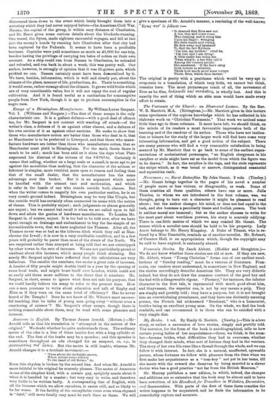Anacreon in English. By Thomas James Arnold. (Hotten.)—Mr• Arnold tells
us that his translation is "attempted in the metres of the .original." We doubt whether he quite understands them. The ordinary metre of the odes is a line of three iambic feet with a long syllable at the end. The first of the iambs may be a spondee ; and this spondee is sometimes throughout an ode changed for an anapest, as, e.g., in mccovwcriot; ereti ijpctic. But the metre is still iambic, whereas Mr. Arnold changes it to a trochaic movement :—
"Pwas about the midnight season, When Arctus turns already To the hand of old Boiites," &c.
Even this rhythm is broken by the second line. And when Mr. Arnold is more faithful to his original he scarcely pleases. The metre of Anacreon is one of the simplest kind, with a certain gay, sprightly music about it when it is handled by a master ; but very easy to write, and therefore very liable to be written badly. A corresponding line of English, with all the licences which we allow ourselves, is easier still, and so likely to be far worse. If the facility of the octoayllabic verse even when rhymed
i5 "fatal," still more fatally easy must be such lines as these. We will give a specimen of Mr. Arnold's manner, a rendering of the well-known "Eine; erer' Y Moro :— "It chanced that Eros saw not
A bee, that mid some roses Was sleeping, and it stung him Upon his finger; wringing The little hands and crying, He flew away and hastened To find the fair /Cythera.
'I'm lost, my mother!' cried he, 'I'm lost, and I am dying!
A little snake has stung me, 'Twits wing'd; a bee they call it Among the country people.'
She answered: 'If the bee's sting Doth torture so severely, Think how much more must torture Those, Eros, which thou dartest.'
The original is pretty with a prettiness which would be very apt to evaporate in a translation, of which very little, we cannot but think, remains here. The most picturesque touch of all, the movement of Eros as he flies, dprilbaubixcei orertiodets, is wholly lost. And this is exactly the sort of thing which an able man would have made every effort to retain.


































 Previous page
Previous page